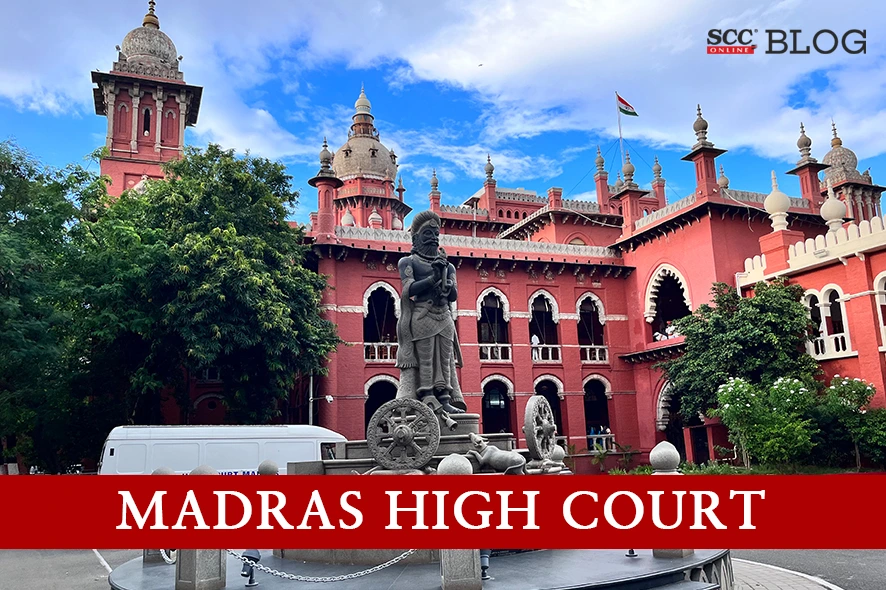Madras High Court: In a petition praying for declaring the invalidation of the petitioner’s answer paper in Essay Part-B (Main Exam) for recruitment to posts included in Combined Civil Services Examination-II Group-II Services (2013-2014) conducted by Tamil Nadu Public Service Commission (‘TNPSC’), on 08-11-2014 as illegal and consequently to direct the respondent to evaluate the petitioner’s answer paper and award marks and consider the petitioner for appointment to the posts included in Combined Civil Services Examination-II Group II Services, Battu Devanand, JJ. while holding the above action of TNPSC as illegal, unjust and arbitrary and violative of Articles 14 and 21 of the Constitution of India, has directed TNPSC to validate the petitioner’s answer papers. Further, based on the marks awarded in Part-A and Part-B, provided she has secured requisite marks, to appoint her to the post included in Combined Civil Services Examination-II Group-II Services within a period of four weeks from the date of receipt of a copy of this order.
Background:
In the case at hand, the petitioner has concluded the answer to the question “Write a detailed account on importance and conservation of natural resources” by writing as “Jai Hind, Let us live united with nature”.
As per TNPSC, the petitioner has written some impertinent remarks in the answer, i.e., at the end of the answer, the petitioner has written the words “Jai Hind”, which are not relevant to the question. As such, the petitioner had violated the instructions under Part 16(iii) of the Instructions to Candidates appearing for descriptive type examination and accordingly, the answer paper of Part-B examination of the petitioner was invalidated by TNPSC.
According to the petitioner, it is very much relevant to the question as the concluding remarks to the answer. She submitted that invalidating the answer paper is per se illegal and the same is not sustainable and the last line is relevant to the question and TNPSC has mechanically held it as invalid without any application of mind.
Issue: Whether the invalidation of the petitioner’s answer paper is right or not in view of the facts and circumstances?
Analysis:
The Court said that the ordinary meaning for the word “impertinent” means not pertinent to a particular matter. While invalidating the answer paper of the petitioner on the ground that the petitioner made some impertinent remarks at the end of the essay, TNPSC should have considered the entire essay written by the petitioner. Only the competent examiner can decide whether the words written can be considered as the concluding remarks to the answer to the question in Part-B. TNPSC cannot took a decision invalidating the answer paper of the petitioner concluding that the said words written by the petitioner at the conclusion of the essay are impertinent.
While visualising this issue from a different angle, the Court said that for development and prosperity of the country, the conservation of natural resources is essential and important. It is the duty of every citizen to safeguard the natural resources available in the country. Those persons, who have the idea of “patriotism”, safeguard the natural resources for the benefit of the future generations. Thus, while writing essay, on the issue of importance and conservation of natural resources, at conclusion writing “Jai Hind — Let us live united with nature” by the petitioner is very relevant and appropriate to the question and as such, the said words cannot be treated as impertinent remarks or to give some indication to the examiner about her identity.
As per the Court, while writing an essay on “importance and conservation of the natural resources” some young scholar or educated youth would naturally become emotional and while discussing the ways of protecting nature in the interest of society, may spontaneously feel patriotic. In such a moment of reflection and soul searching, for some youth, it’s a natural way of expression to end an essay or a speech with some patriotic slogan, summarizing the essence of the topic such as “Jai Hind”.
Thus, as per the Court, the said words appear to be a natural, spontaneous and effective culmination of the essay on the given topic rather than any tacit signal of attempting any malpractice. Therefore, the Court opined that the respondents ought not to have invalidated the answer sheet Part-B examination of the petitioner in a routine manner.
Therefore, the Court held that the action of TNPSC in invalidating the petitioner’s answer paper in essay Part-B (Main Examination) for recruitment to the post included in Combined Civil Services Examination-II Group-II services 2013-14 as illegal, unjust and arbitrary and violative of Articles 14 and 21 of the Constitution of India.
[M. Kalpana v Secretary, TNPSC, 2023 SCC OnLine Mad 6971, Order dated 06-11-2023]
Advocates who appeared in this case :
For Petitioner: Advocate G. Karthik
For Respondent: Standing Counsel V. Panneer Selvam







